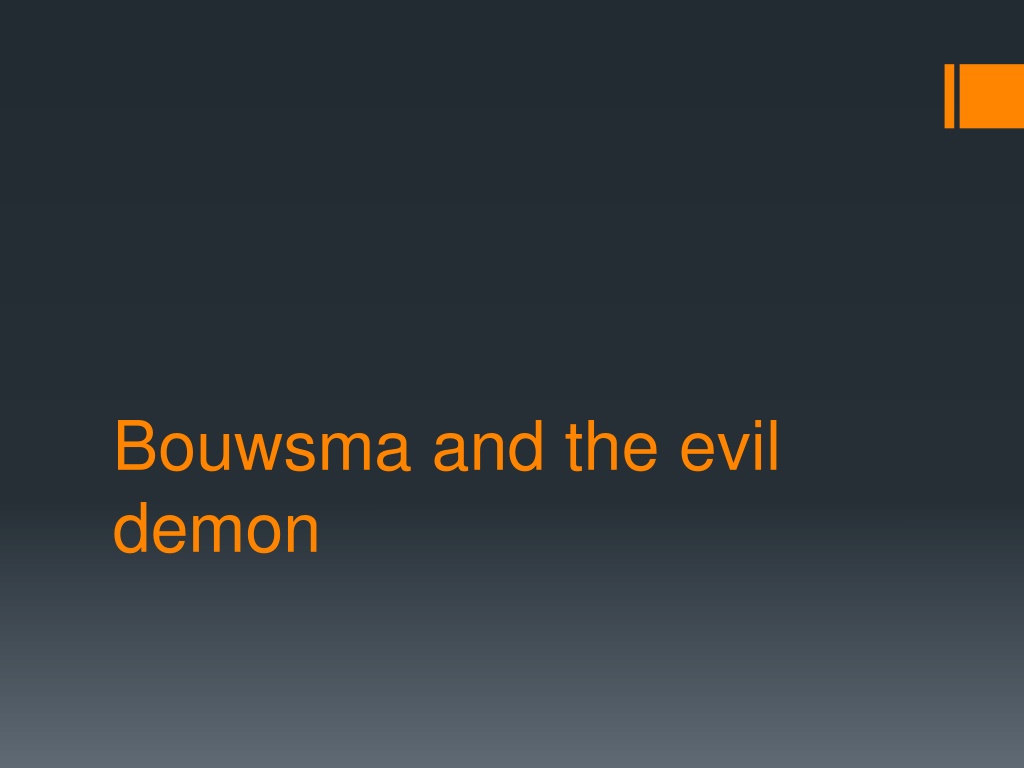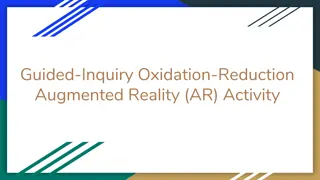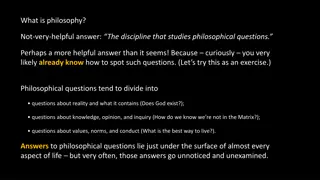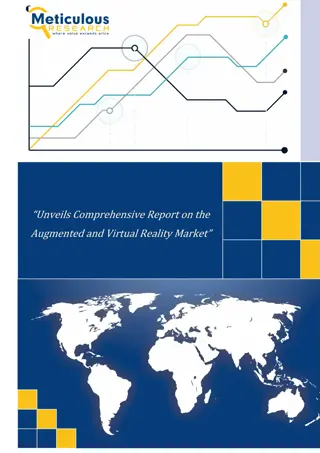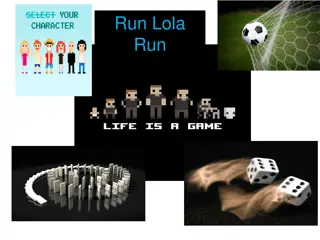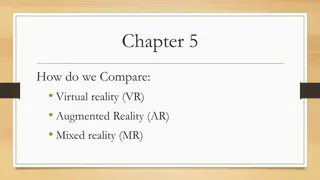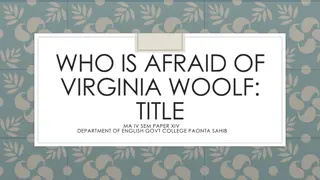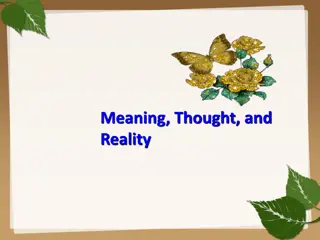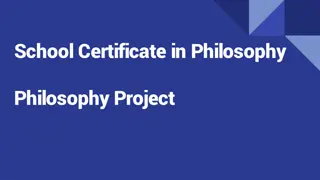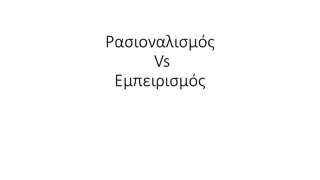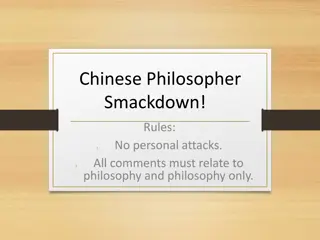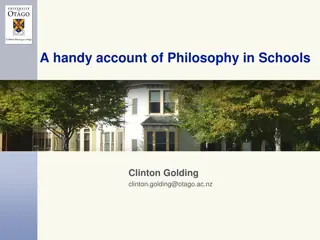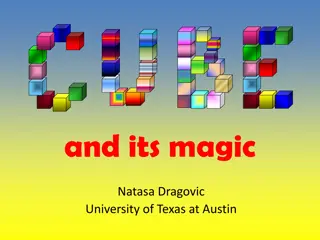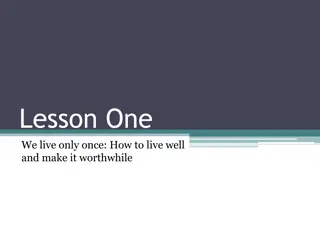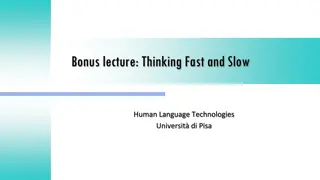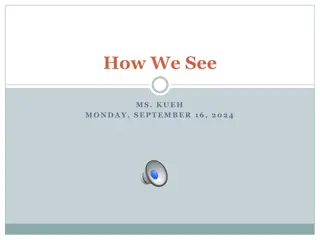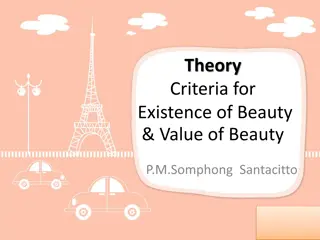Illusions and Reality in Philosophical Thought
Explore Bouwsma's philosophical insights on illusions and reality through scenarios involving an evil demon and a deceptive world. Learn how individuals can distinguish between illusion and reality in thought experiments involving deception and perception.
Download Presentation

Please find below an Image/Link to download the presentation.
The content on the website is provided AS IS for your information and personal use only. It may not be sold, licensed, or shared on other websites without obtaining consent from the author. Download presentation by click this link. If you encounter any issues during the download, it is possible that the publisher has removed the file from their server.
E N D
Presentation Transcript
Bouwsma and the evil demon
Bouwsmas Goal Bouwsma tries to show that in the evil demon scenario we are not actually deceived. Contrary to what Descartes assumed, in such a world all of our ordinary beliefs are still true!
Demon vs. Tom Round 1: Paper World While Tom sleeps the demon replaces everything in the world with paper. Tom, though fooled (visually) at first, is easily able to uncover the illusion by using his other senses.
Demon vs. Tom Round 1: Paper World Bouwsma draws two lessons from this case. First: An illusion is something that looks like or sounds like, so much like, something else that you either mistake it for something else, or you can easily understand how someone might come to do this. (117)
Demon vs. Tom Round 1: Paper World Second, an illusion requires that the deceived can tell the difference between the illusion and reality. This does not mean that one cannot be deceived by an illusion, but one must be able to understand the difference between the two (e.g. paper world vs. actual world).
Announcements My office hours this week are cancelled for tomorrow. I will hold my office hours on Friday from 11AM-1PM. Thomson has been postponed again!
Tom vs. the Demon Round 2: Demon World While Tom sleep the demon destroys everything besides Tom and makes it so that Tom will continue to think that everything is just as it was yesterday.
Tom vs. the Demon Round 2: Demon World There are to be no flowers, no Milly, no paper. There is to be nothing at all, but Tom is every moment to go on mistaking nothing for something, nothing at all for flowers, nothing at all for Milly, etc And yet all is to be arranged in such a way that Tom will go on just as we now do He will love flowers, he will kiss Milly, he will blink at the sun. So he thinks (119)
Tom vs. the Demon Round 2: Demon World In this case there is no way, even in principle for Tom to detect the change. All his perceptual experiences are identical to what they were before. This is just like our cases of radical deception (Matrix/BIV/Evil Demon)
Tom vs. the Demon Round 2: Demon World In Bouwsma s story the Demon attempts to explain to Tom the nature of his deception. In response Tom claims that by flower he just means thing that smells, feels, looks, etc. this way. According to this line of thinking, the demon has not created a world in which there are no flowers and Tom is not deceived!
Thick vs. Thin Illusions Thin Illusion: e.g. lowers in a mirror and paper flowers; they only look like flowers. They do not have all of the qualities a flower has. Thick Illusion: A demon flower. Mirrors all the properties of a flower. It looks, feels, smells, tastes, etc. like a flower.
Thick vs. Thin Illusions Tom s reply: I see that what you mean by thin illusion is what I mean by illusions, and what you mean by thick illusions is what I mean by flowers. So when you say that my flowers are your thick illusions this doesn t bother me. And as for your mirror that mirrors all layers of your thick illusions, I shouldn t call that a mirror at all. It s a duplicator. (78)
Thick vs. Thin Illusions The demon replies that HE has a sense by which he can tell real flowers from demon flowers: (thick illusions from reality). Tom lacks this sense, so he can t tell the difference, but there is a genuine difference.
Thick vs. Thin Illusions But this doesn t help! According to Tom all the demon has done is get rid of things he can sense in this special way. He hasn t gotten rid of flowers because flowers are just things that look, smell, taste and feel a certain way!
Two Interpretations There are two ways of trying to make sense of Bouwsma s remarks: (1) Linguistic Interpretation (2) Metaphysical Interpretation
Bouwsmas Argument: Linguistic Interpretation Our word flower means something different than the demon thinks. The word flower just means something that looks, smells, tastes and feels a certain way. So if the demon means to use our word flower when he says There are no flowers what he says is false. So Tom is not deceived.
On the Linguistic Interpretation What we mean by flower is clearly not just some set of observable characteristics: Flowers have a wide range of these (colors shapes, tastes, etc.) and we call them all flowers. We can imagine discovering a new plant that did not have these observable characteristics that we would call a flower.
On the Linguistic Interpretation What about Milly? When Tom talks about Milly, he doesn t mean some person or other with certain characteristics. He uses the word Milly to refer to Milly, not some identical duplicate or clone.
On the Linguistic Interpretation Someone is deceived just in case the world is different than they believe it to be. Whatever Tom would call a flower or call Milly seems entirely irrelevant to the question of whether or not flowers or Milly exist!
Bouwsmas Argument: Metaphysical Interpretation Flowers just are things that looks, smell, taste and feel a certain way. What it is to be a flower is exhausted by its observable characteristics. So the demon has not created a world in which there are no flowers, because there are things with those observable characteristics. So Tom is not deceived because all his ordinary beliefs are true.
On the Metaphysical Interpretation Things can have all the observable characteristics of flowers, but not be flowers What it is to be a flower probably involves a certain kind of evolutionary history that is not directly observable.
On the Metaphysical Interpretation What about Milly? Things are even worse! According to the story, the demon destroys Milly, but Tom still experiences something that looks, feels, smells and acts like Milly.
On the Metaphysical Interpretation What if someone destroyed your partner or someone else close to you and replaced them with a perfect duplicate? Would you be at all inclined to say that the duplicate was the same person?
The Experience Machine We don t just care about what we can experience (i.e. what is observable) we also care deeply that the world actually is the way it appears to be.
The Experience Machine Suppose there were an experience machine that would give you any experience you desire. Superduper neuropsychologists could stimulate your brain so that you would think and feel you were writing a great novel, or making a friend, or reading an interesting book. All the time you would be floating in a tank, with electrodes attached to your brain. Should you plug into this machine for life, preprogramming your life s experiences? (Nozick: Anarchy, State and Utopia, 81)
The Experience Machine Whatever you want in your life, the experience machine can be programmed to give you experiences of doing that very thing. Of course, you aren t actually doing it. You are sitting in a vat! Would you plug in?
Summation What all of this shows is that Bouwsma is simply wrong about his diagnosis of the evil demon case.
Summation The correct description of the case is to say that Tom thinks that the world is a certain way (that it has water, flowers, and Milly), but that the world is not that way. In other words, he is deceived, just as Descartes assumed.
